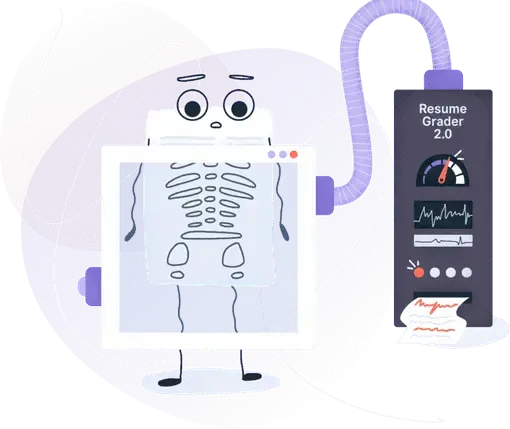Nursing Skills for a Resume: A Complete Guide in 2026
Make every shift count with skills that shine on your resume!


Is your resume ATS-friendly?
Drop your resume here or upload a file to find out if the skills in your resume are readable by an ATS.
Imagine stepping onto a bustling hospital floor, where every action—from a precise IV insertion to a comforting word—relies on the diverse skills of nurses like you.
In the U.S., there are over 3.1 million registered nurses, and the demand is growing, with more than 203,000 new positions projected annually through 2031. These numbers underline the need for skilled professionals who can balance medical expertise and compassionate care.
Illustrating your clinical core competencies on a resume can be tough. But don't worry because this guide will help you craft a resume that captures attention and meets the demands of healthcare in 2025.
Key takeaways
- Tailor your nursing skills to the job description, focusing on those most relevant to the role.
- Structure your resume strategically, placing skills in the summary, experience, and achievements sections for maximum impact.
- Include certifications like ACLS, BLS, or CCRN to validate specialized expertise.
- Mention telemedicine experience, such as managing virtual consultations or using telehealth platforms, to show proficiency in modern healthcare.
What are nursing skills?
Nursing skills are the key to good care, enabling nurses to provide high-quality support in diverse settings like hospitals, clinics, nursing homes, and patients' residences.
These skills combine medical competencies, technical know-how, and people skills to ensure care is both accurate and kind. They’re divided into two main types: hard and soft skills. Together, they help nurses meet their patients' needs in the best way possible.
Soft skills are often better showcased in sections like the summary, experience, and achievements, where you can demonstrate how they’ve been applied in real situations. In contrast, hard skills are more effectively listed in a dedicated skills section to highlight your technical expertise at a glance.
Clinical skills
- Giving medications and treatments
- Checking vital signs
- Cleaning and dressing wounds
- Inserting catheters
- Helping with mobility
- Performing health checks
- Responding to emergencies
Technical skills
- Using medical devices
- Recording patient data
- Working with healthcare software
- Following infection control rules
- Drawing blood and collecting samples
- Maintaining medical equipment
- Sterilizing tools
Soft skills
When targeting a new nursing specialty, focus on transferable skills. If you’ve done similar tasks, emphasize them to illustrate adaptability. Tailor your resume to match the job description, prioritizing skills that align with the specialty.
When to put nursing skills on a resume
It’s clear that nursing skills are essential for any nurse's resume and you should always include them on your application. But where and how you show them depends on the situation. If you’re moving into a new specialty, focus on transferable skills.
Additionally, nursing skills can be valuable beyond direct patient care, such as in public health, clinical research coordination, or health education. In these cases, tailor your resume to display how these skills align with the new role.
The key is to strategically place them where they make the strongest impact.
Nursing Skills in Non-Clinical Roles
In 2023, approximately 15% of registered nurses in the United States were employed in roles not involving direct patient care, such as healthcare administration, medical sales, and patient advocacy.
Given the total RN workforce of over 3 million, this equates to about 450,000 professionals applying their nursing skills in non-clinical settings.
How to list nursing skills on a resume
Nursing skills are a critical component of your resume, whether you’re pursuing a clinical role or exploring new opportunities within healthcare. Providing care to others takes compassion because nursing isn’t just a job—it's a calling that impacts lives daily.
Your resume should reflect your commitment to patient care and demonstrate how your skills make a tangible difference in outcomes and experiences.
Here’s how to list your nursing skills effectively to leave a strong impression:
- Include examples of how you’ve handled emergency situations or responded to critical care needs.
- Feature organizational skills by mentioning experience coordinating with multidisciplinary teams.
- Highlight certifications, such as BLS or ACLS, and specialized training relevant to the role.
- Quantify your achievements, such as reducing wait times or improving patient satisfaction scores.
- Mention familiarity with healthcare software or systems for recordkeeping and communication.
- Include experience managing supplies, maintaining equipment, or ensuring compliance with safety standards.
- Demonstrate leadership by sharing examples of mentoring or training new staff.
- Outline your strong work ethic by sharing examples, like going the extra mile to improve care quality or keeping things running smoothly even with a heavy workload.
Ready to put these tips into action? Let’s dive into the critical care nurse sample below.
Resume sample for showing nursing skills on a resume
Sarah Mitchell’s approach is a great example of how to craft a standout resume. Take a look at the free sample below and use Enhancv’s builder to create a resume tailored to your nursing career.
Sarah Mitchell
Critical Care Nurse
(512) 555-907X | s.mitchell@enhancv.com | @Linkedin | Dallas, TX
Summary
Compassionate and detail-oriented critical care nurse with over eight years of experience in ICU and trauma settings, managing an average of 12 critical patients daily. Skilled in advanced patient care, performing over 500 emergency interventions, and coordinating multidisciplinary teams of up to 10 members. Dedicated to improving patient outcomes with a proven track record of achieving a 95% compliance rate in care protocols and enhancing recovery rates.
Experience
Critical Care Nurse
Dallas Regional Medical Center, Dallas, TX
August 2016 – Present
- Manage care for critically ill patients, including ventilator setup, medication administration, and monitoring vital signs.
- Act as a preceptor for new nurses, improving team readiness and skill development.
- Collaborate with physicians and specialists to develop and implement patient care plans.
Staff Nurse
Parkside Hospital, Dallas, TX
May 2013 – July 2016
- Delivered patient-centered care in a high-volume ER, ensuring accuracy under pressure.
- Supported families through critical situations with clear communication and empathy.
- Assisted in training new staff to ensure adherence to hospital protocols and improve team efficiency.
Education
Bachelor of Science in Nursing (BSN)
Texas A&M University, College Station, TX
Graduated: 2013
Certifications
- Pediatric Advanced Life Support (PALS) (2021)
- Advanced Cardiovascular Life Support (ACLS) (2022)
- Basic Life Support (BLS) (2023)
Skills
- Emergency Response
- Electronic Medical Records (EMR)
- Ventilator Management
- Infection Control
- Medication Administration
- Patient Monitoring
- Advanced Life Support (ALS) Techniques
Languages
- English (Native)
- Spanish (Working proficiency)
Sarah Mitchell’s personalized critical care nurse resume is a great starting point, but there’s always room for improvement.
Try Enhancv’s fast and free resume checker to make sure your nursing qualifications meet ATS standards.
Where to put nursing skills on a resume
Your nursing skills are the heartbeat of your resume. They show how you make a real difference in patient care and teamwork. By displaying them in the right places, you’ll grab attention and prove you’re exactly what the role needs.
Here’s where to feature your nursing skills:
- Summary or Objective Statement: Mention your key nursing skills, such as critical care or patient monitoring, to immediately grab attention.
- Experience section: Write how you’ve applied your skills in past roles with examples of responsibilities and measurable outcomes.
- Achievements section: Underscore accomplishments, like improving patient outcomes or streamlining care processes, that reflect your nursing expertise.
- Education: Include relevant coursework or clinical rotations that outline skills gained during your studies.
- Certifications: Add certifications like ACLS, BLS, or CCRN to validate your technical abilities and specialized training.
How to present nursing skills in the summary
Your summary is your resume’s personal statement, so it needs to pack a punch. A strong summary blends your expertise, top skills, and the impact you've made in previous roles.
Below is a PACU nurse resume example that presents nursing skills effectively.
How to present nursing skills in the experience section
In the experience section, let your abilities speak for themselves. Highlight real-world examples of providing care and driving results. Strengthen your bullets with action verbs and measurable achievements.
Below is an example of a hemodialysis nurse.
- •Provided care for 15+ patients daily, managing pre- and post-dialysis assessments and treatments.
- •Monitored and adjusted dialysis machines to ensure safe and effective treatment outcomes.
- •Educated patients on dialysis procedures and lifestyle adjustments, leading to a 20% improvement in adherence rates.
- •Collaborated with a multidisciplinary team to develop individualized treatment plans and improve patient satisfaction scores by 15%.
How to present nursing skills in an achievements section
The achievements section is a great place to draw attention to the results you’ve had. Write specific accomplishments that clearly show your expertise and value.
Take a look at this example for a pediatric nurse.
Nursing skills progression
As nurses progress in their careers, their skills expand through hands-on experience, continued education, and specialization. This growth allows them to handle more complex responsibilities and develop advanced clinical expertise.
Here’s a closer look at how nursing skills progress through different stages of a career.
Entry-Level Positions
Entry-level roles focus on mastering the basics of patient care and developing essential clinical and interpersonal skills.
Positions Include: CNA, LPN, and early-career RN
Examples:
- Assisted with patient hygiene and mobility.
- Accurately recorded vital signs for review by senior staff.
- Delivered basic medications under supervision.
- Supported patients and families during care processes.
Intermediate Positions
Intermediate roles involve honing technical skills, managing specialized care, and collaborating within multidisciplinary teams.
Positions Include: Staff Nurse (e.g., ICU, ER, pediatrics), Charge Nurse, Dialysis Nurse, and PACU Nurse
Examples:
- Provided specialized care in fast-paced units.
- Managed advanced therapies and medications independently.
- Collaborated with physicians to implement effective treatment plans.
- Guided new staff to maintain care standards.
Advanced and Leadership Positions
Advanced roles require expertise in clinical practices, leadership abilities, and the capacity to drive improvements in patient care and healthcare operations.
Positions Include: NP, CNS, CRNA, Nurse Educator, Nurse Manager, and CNO
Examples:
- Developed and executed care policies to improve patient outcomes.
- Led teams during critical situations to ensure safety and efficiency.
- Educated staff and patients to enhance care quality.
- Implemented data-driven strategies to optimize department performance.
How to quantify nursing skills
Adding numbers to your nursing skills brings your resume to life. It’s not just about saying you’re skilled—it’s about showing the results you’ve achieved.
Whether it’s improving patient recovery rates or speeding up processes, measurable outcomes make your experience more credible. They prove your worth as a nurse who gets real results.
Best practices for measuring nursing skills + examples
- Underline patient outcomes: Improved patient satisfaction scores by 20% through effective communication and personalized care plans.
- Showcase patient volume: Managed care for 12+ patients daily in a high-acuity ICU, maintaining excellent patient safety standards.
- Demonstrate efficiency: Reduced patient discharge times by 15% by streamlining handoff communication and documentation processes.
- Illustrate cost savings: Implemented inventory control measures, reducing waste by 10% and saving $5,000 annually.
- Prove leadership impact: Mentored five new nurses, increasing unit efficiency and reducing training errors by 25%.
- Highlight emergency response: Stabilized 95% of critical patients within the golden hour, improving survival rates.
Seven tips on how to improve your nursing skills
Nursing is a dynamic field, and staying ahead means constantly sharpening your skills. Investing in your abilities boosts your confidence and leaves a lasting impact on your patients and team.
Ready to level up? Here’s how you can keep improving:
- Pursue continuing education: Stay updated with the latest nursing practices by attending workshops, webinars, or enrolling in advanced courses. Certifications or specialized training in areas like wound care or dialysis can also strengthen your expertise.
- Explore telemedicine skills: Develop expertise in remote care technologies by learning to conduct virtual consultations, manage telehealth platforms, and provide patient education in a virtual setting.
- Stay current with technology: Familiarize yourself with healthcare technology, such as electronic medical records (EMRs), monitoring devices, and new equipment, to enhance your efficiency and adaptability.
- Participate in simulation training: Take part in simulation labs or emergency drills to practice critical scenarios in a controlled environment, boosting your confidence and decision-making abilities.
- Join professional organizations: Becoming a member of nursing associations like the ANA or specialty groups provides access to resources, networking opportunities, and best practices in the field.
- Read nursing journals and research: Stay informed about emerging trends and evidence-based practices by reading industry publications. This helps you incorporate the latest knowledge into your daily work.
- Volunteer for challenging assignments: Take on roles in high-acuity areas like the ICU, ER, or a specialty clinic to push yourself outside your comfort zone and develop new competencies under pressure.
Conclusion
Listing your nursing skills the right way can show employers what you’re great at and how you make a difference. Focus on the skills that matter most for the job and include real examples to back them up. A well-organized resume can help you stand out and land the role you’ve been dreaming about.
Make one that's truly you.




